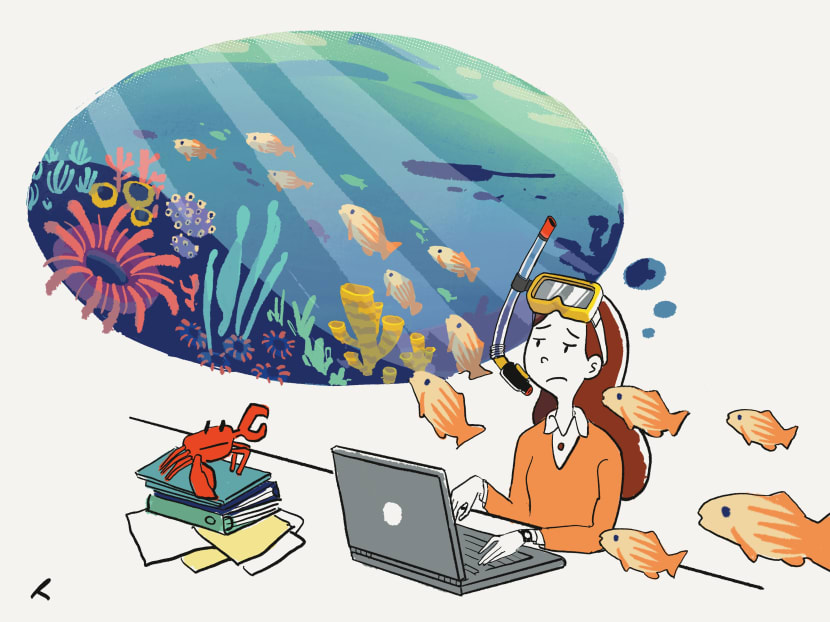Nearly eight in 10 'vacation deprived' Singaporeans would take a pay cut to get more time off: Survey
SINGAPORE — A growing number of Singaporeans feel so deprived of vacations that they are willing to take a pay cut to get more time off, a survey by Brand Expedia has found.

A study found that the main reason why Singaporeans are not taking time off for holidays is because the boss says no.
SINGAPORE — A growing number of Singaporeans feel so deprived of vacations that they are willing to take a pay cut to get more time off, a survey by Brand Expedia has found.
The survey, published on Thursday (July 25), said that Singapore is rising up the ranks of countries in terms of “vacation deprivation”. Nearly eight in 10 Singaporeans, or 77 per cent, would accept less pay to get one more day’s leave, it found.
And more than half the respondents stay connected to work through their devices even when they are on holidays. More than half of the Singaporeans surveyed also take fewer days of leave than their annual entitlement.
Singapore is now ranked sixth out of the 19 markets in terms of vacation deprivation, Brand Expedia’s 2018 Vacation Deprivation Study noted. It was ranked seventh in the 2017 survey. India is the most vacation-deprived among the 19.
Brand Expedia, which offers platforms for booking hotels, holidays and activities, and has a financial interest in promoting holidays, surveyed 11,000 full-time working adults across 19 markets, including 300 respondents from Singapore.
NOT ENOUGH LEAVE DAYS
The study found widespread dissatisfaction among full-time workers here over how often they get to take a break.
More than six in 10 Singaporeans said that they are deprived of vacations. This is up from 57 per cent in 2017, and just 41 per cent in 2016.
Almost 90 per cent of Singaporeans surveyed felt that they deserve more vacation days. This is a 12 percentage-point jump from 2017.
MOST VACATION-DEPRIVED IN THE WORLD
Vacation deprivation is growing across the globe but the Asia-Pacific region stood out as the most vacation-deprived in the world.
Seven in 10 of the most vacation-deprived markets came from the Asia Pacific, including Australia, Hong Kong, India, Malaysia, Singapore, South Korea and Thailand. France, Italy and the United States make up the rest.
India and Thailand registered the biggest jumps in vacation-deprivation sentiment, of 15 percentage points and 14 percentage points respectively, from 2017 to the latest study.
WHY THEY ARE NOT ON HOLIDAY
Delving deeper into the vacation behaviour of Singaporeans, the study found that a key reason for not taking time off for holidays is because the boss says no.
Being unable to get time off work emerged as the top reason, at 39 per cent, for not going on a holiday.
The next most common reason, at 30 per cent, was a wish to save up time for a long holiday.
About one in five respondents, or 22 per cent, said that they could not afford a holiday.
UNABLE TO LEAVE WORK BEHIND
Many Singaporeans who do manage to go on a holiday still stay connected to work, the survey found.
About five in 10 admitted that they tend to stay connected to work during their holidays.
Almost 80 per cent checked their emails or voicemail at least once. Of these, 27 per cent do so at least once a day.
One in three said that they are expected to be available constantly by their supervisors. This is the third highest percentage across the globe, behind India and Malaysia.
Speaking to TODAY, Ms Teo Wen Yen, 33, a mortgage specialist at a bank, said that even though she answers work-related calls while on holiday, it is a choice employees make.
“It can be very stressful even when I'm on leave because customers will still call to ask questions, so I will still check my phone when they WhatsApp or call or email. But it’s a choice employees can make, though it may affect your (career progression).”
Consultant Jeslyn Tan, 30, said that bosses nowadays expect workers to stay in touch. It is very common at multinational corporations where she has worked, she added, for employers or colleagues to contact a staff member on leave.
“My previous managers have told us that there is no work-life balance, only work-life integration where we need to learn to integrate work into our daily lives. From their point of view, smartphones and tablets should be considered a convenience for us to work on-the-go, regardless if we are overseas, on our annual leave or have already left work for the day.”
CARE FOR MENTAL HEALTH
Singaporeans are starting to realise the importance of taking care of their mental health, just like the rest of the Asia-Pacific region, the study found.
Seven in 10 Singaporeans have taken at least one "mental health day" in the past year, a day defined by the survey as people taking leave with the aim of improving their mental wellness in general.
On average, Singaporeans took three mental health days last year and another 2.8 days for “life administration”, which refers to people taking leave to take care of their personal chores and errands for daily living.
Ms Lavinia Rajaram, head of communications at Brand Expedia, Asia Pacific, said: “As vacation deprivation continues to rise in Singapore, it is now more important than ever for business leaders to identify the reasons behind these sentiments, in order to foster an enabling culture for employees to take quality time off and make the most of their vacation time, for the good of their personal and professional well-being in the long run.”








